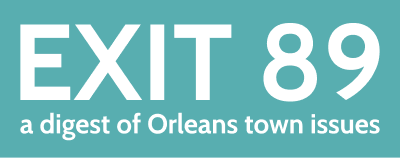Happy Spring, Orleans!
May is busting out all over and the countdown to summer has begun. Our Annual Town Meeting is less than a week away. EXIT 89 is here to help you prep.
The Warrant is shorter this year, just 36 articles. (There were 54 last May.)
Will the meeting be brief, too?
One never knows.
What we do know: New England’s tradition of Town Meeting is democracy in its purest form — and a privilege that most people in the world don’t have. A tradition believed to have begun in 1622 in Dorchester, Massachusetts, Town Meetings have been held in cities and towns throughout New England for centuries. Until a few decades ago, many meetings lasted all day long — and sometimes continued the next day. The men — only “freemen” were allowed to attend — chewed dill or caraway seeds, a.k.a. “meeting house seeds,” to promote concentration. And lunch, including “Town Meeting Cake” (aka “Election Cake”), was often served.
What’s on the Warrant this year? Some big-ticket items and big decisions about the future of Orleans. We will be voting on measures to protect our unique natural resources — including proposals to spend $40 million for Phase 3 of our epic Wastewater project and $5 million for new solar developments. Protecting our residents is a priority too, with an article proposing $4.5 million for the design of a new Fire-Rescue station.
When: Monday, May 12, 6 PM
Where: The Nauset Regional Middle School Gym
Doors open at 5 PM. You may want to arrive early to check in, grab a handheld electronic voting gizmo, and find a seat. Bring some water, maybe a snack, and your copy of the Warrant. (There are also printed copies available at Town Hall.) Channel 8 will record and live-stream the entire meeting, but all votes must be cast in person.
Families: The Orleans Recreation Department has you covered. Free childcare and pizza will be available at the Nauset Regional Middle School from 6 to 9 PM for children ages 4 to 13. Pre-registration is required and, most importantly, you need to be registered by this Friday, May 9.
We hope you’ll attend! Exercising our democracy muscles keeps us strong. As the saying goes, “Use ‘em or lose ‘em.”
Here's a selection of articles EXIT 89 believes will matter most to residents. . .
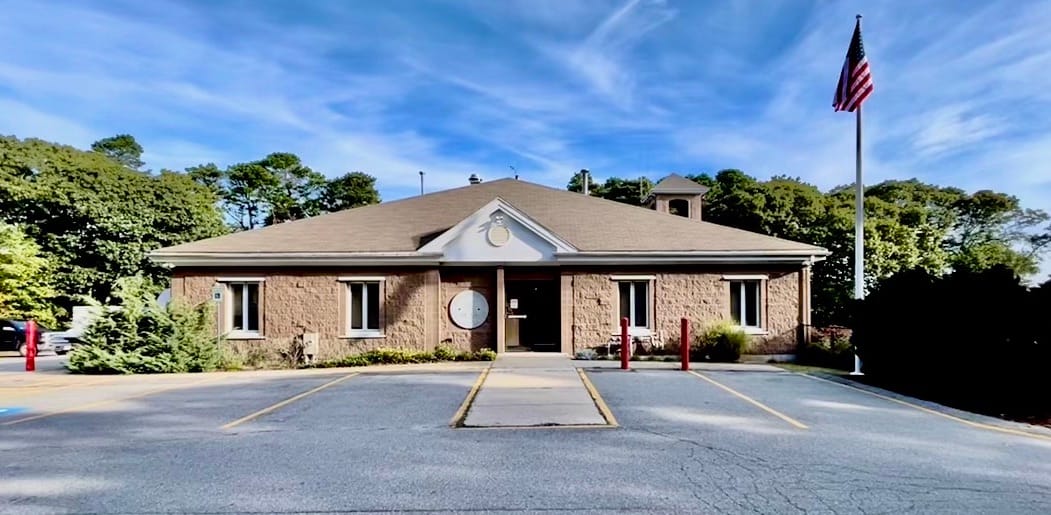
Article 12: New Fire-Rescue Station Design
This conversation’s been going on for years — long before Town Manager Kim Newman arrived in Orleans and deemed a new Fire-Rescue station her top priority.
Until recently, Newman had planned to ask voters to approve borrowing for both design and construction costs — estimated to be $45 million — for the much-needed station. But on April 9th, she informed the Select Board that only the design costs, typically 10 percent of a project’s estimated total cost, would be on the Warrant. Why? She expressed concern that $45 million may not be accurate, and that “the only way to rectify that” is to do the design first, then bring a full construction plan and its total projected cost to residents at a later date. She also cited the uncertainty of the current economic climate as a factor.
You can listen to Episode 33 of the Town of Orleans podcast Orleans: Behind the Scenes about why Orleans needs a new fire station. And you can see the estimated property tax impacts of the $4.5 million here.
The Orleans Select Board voted unanimously to support the article. The Orleans Finance Committee voted unanimously in support, with one abstention. A two-thirds majority vote at Town Meeting is required for it to pass, followed by the approval of a Proposition 2½ override on the Town Election ballot on May 20. (If you are confused about what triggers an override, check out the glossary of municipal finance terms on pages 71-73 of the Warrant.)
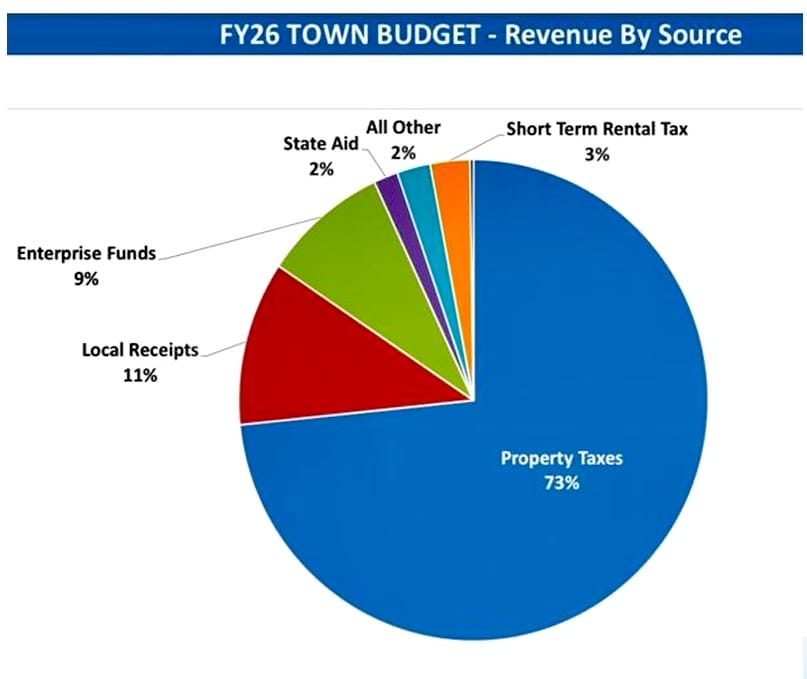
Article 14: The Operating Budget
The FY26 "Orleans Operational Budget" is $53,618,892 — up 4 percent from $51.5 million in FY25. (You can find the full Operating Budget on pages 51-70 of the Warrant.)
We mentioned that the Warrant is leaner this year. While the same can’t be said for this year’s budget, it is presented in a more streamlined way — achieved largely by continuing to move certain recurring expenditures that used to be stand-alone articles into the Operating and Capital Budget.
For example, this year the Chamber of Commerce budget — which is up from $33,000 in FY19 to $65,000 for FY26 — is now part of the Operating Budget (a brief version of which accompanies the article) and has been folded into the broader category of “Human and Community Service Contracts.” Same with funding for the Town’s Pre-K program — $300,000 for “Early Education and Care” is now included in the Human and Community Services Contracts category. How about funding for Habitat Conservation Plan Permits? You’ll have to look inside the Beaches Enterprise Fund budget.
Fewer line items — certainly. And perhaps less transparency. Bottom line: residents will need to do a little more sleuthing if they want to see what they’re actually voting on.
But back to that $53.6 million. What, you may ask, produces that sum?
Let’s start with Town Operating Expenses. Costing just under $32 million, these services — from the Police Department to the Council on Aging to the Water Department and beyond — account for a large slice of the pie. And they will cost more this year than they did last year. Why? One big factor is re-negotiating with unions as employee contracts expire. The ongoing scarcity of qualified employees on the Cape means offering ever-larger compensation packages to stay competitive with neighboring towns. We also continue to have new faces at Town Hall and are hiring eight new firefighters — which also contributes to the need for a nearly $1 million override to help fund additional retirement and benefit costs. (Here’s a description of the estimated property-tax impact of that override.)
Also included in the Town’s Operating Budget are Education (Orleans Elementary, Nauset Regional Middle School, and Cape Tech — $15.3 million total) and $6.4 million of Debt Service.
Looking for more?
For the Finance Committee's take on the FY26 budget and Town’s overall financial picture, check out its annual Report and Letter at the beginning of the Warrant.
To see how the FY26 budget came together, make (a lot of) popcorn and open up the Town Meeting page on the Orleans website. There are live recordings of all the public meetings that go into shaping what you’ll be voting on on Monday night. For a quicker take, listen to Episode 32 of Orleans: Behind the Scenes, featuring Town Manager Kim Newman and Assistant Town Manager Mark Reil discussing the budget process.
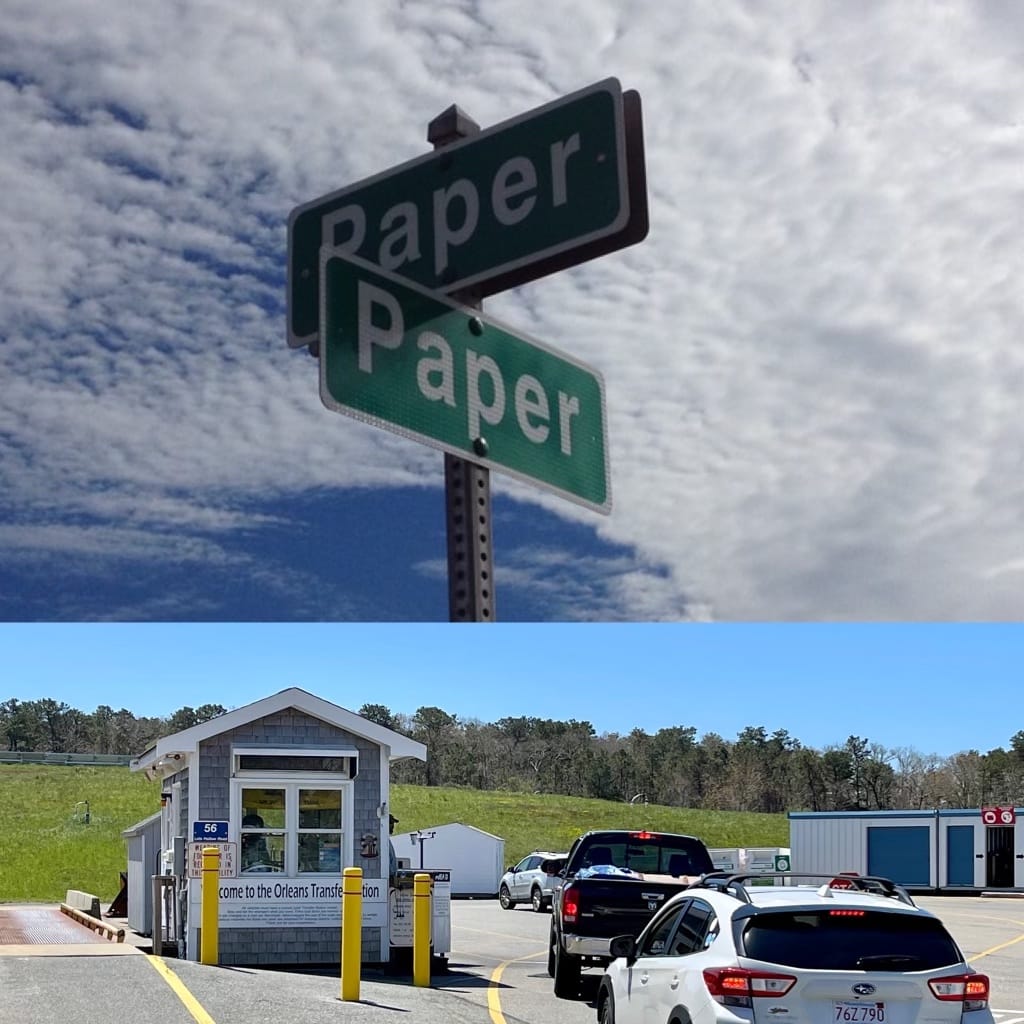
Articles 15-17: Enterprise Funds
The three Enterprise Funds in the FY26 budget — Beaches (Article 15), Sewers (Article 16), and the Transfer Station (Article 17) — are under the management of the Department of Public Works (DPW). An Enterprise Fund (EF) is an accounting method that shows each service in a profit-and-loss format.
The hope is that income from user fees, rather than property tax revenue, will eventually fund the services. After it was decided that two other Enterprise Funds — Rock Harbor and Moorings — would not become self-supporting, citizens at the Fall Special Town Meeting voted to “sunset” them at the end of FY25.
Are the remaining EFs self-supporting?
No. Their costs aren’t covered by user fees. They are made whole by drawing on their individual “retained earnings” funds — savings accounts, basically. (To wade into the weeds for a moment: In the case of Beaches, $530,000 is being drawn from retained earnings — reducing the account to less than the desired 10 percent of its overall budget, per the new Enterprise Fund policy. The Sewer EF is pulling almost $500,000 from retained earnings, as well as $2.4 million from the Wastewater Stabilization Fund. For the Transfer Station EF, $445,000 comes from retained earnings — plus an additional $141,715 supplement supplied by a tax levy subsidy.)
In a change from years past, the budget for each EF includes its debt service, instead of that debt service being included in the Operating Budget. What about fee changes? You’ll find the full list of FY26 fees on pages 78-83 of the Warrant.
All three articles are supported unanimously by both the Select Board and Finance Committee. A simple majority vote at Town Meeting is required for each to pass.
Article 18: The Capital Improvements Plan
The Orleans Town Charter requires that we vote each year on a Capital Improvements Plan (CIP), found here and on pages 84-108 in the Warrant. It’s a look ahead at capital expenses that may be coming down the pike (FY27-FY31) with an emphasis on “may.” When voting on the CIP, residents are not approving or committing to any of the expenditures. It's a way of listing possible future expenses.
For more information, scroll down the “Town Meeting” page on the Town website; you’ll see a selection of CIP documents that provide a more comprehensive look. Both the Select Board and Finance Committee voted unanimously in support. A simple majority vote at Town Meeting is required for the article to pass.
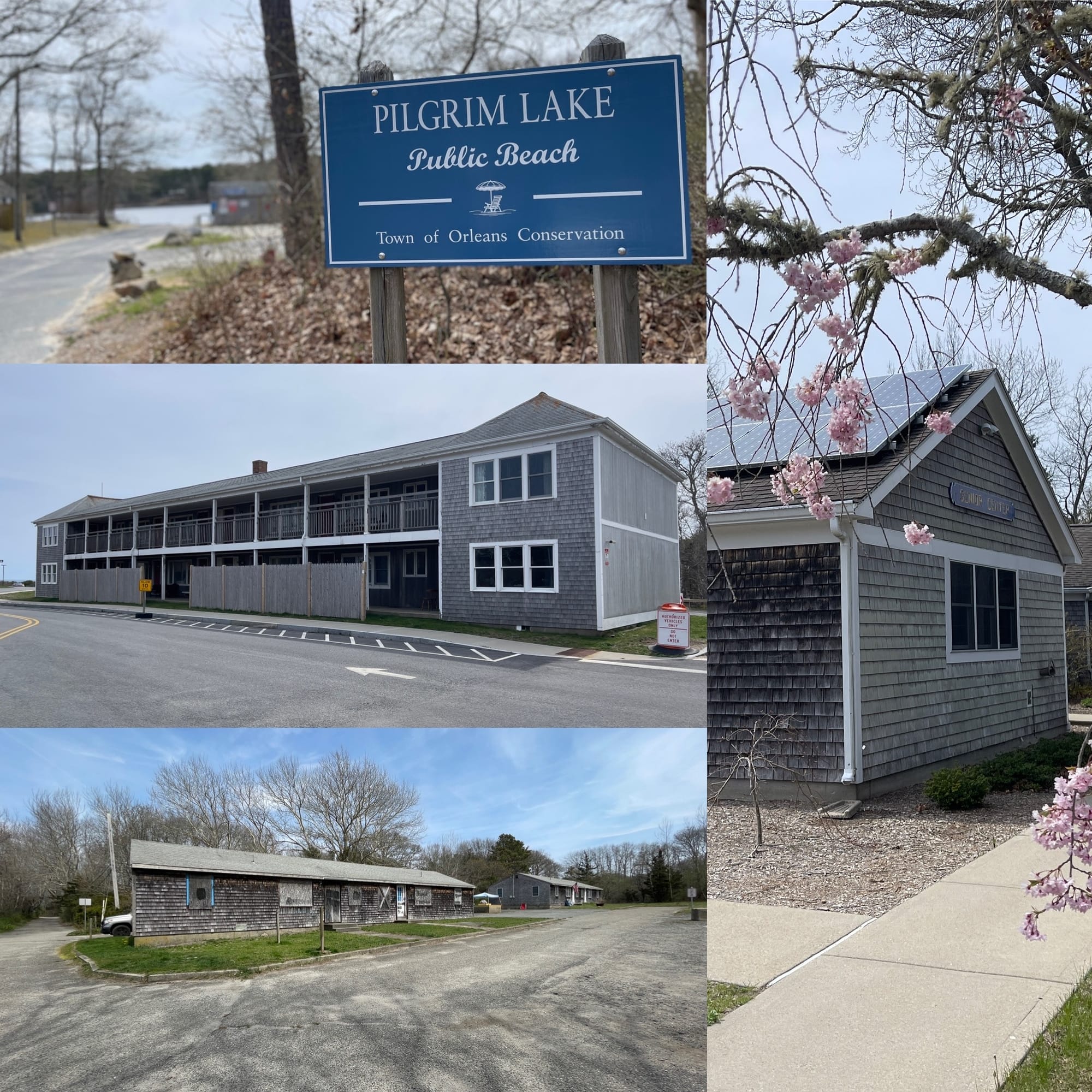
Article 19: The Capital Budget
The Capital Budget Article funds most of the coming fiscal year’s capital projects — and you may notice it looks different this year. In another effort to pare down Town Meeting, all but a few of the capital projects for FY26 have been included in a single article. (Three larger capital projects — the new Fire-Rescue Station design, Town Cove bulkhead replacement, and new solar developments — are stand-alone articles because they authorize borrowing money.)
The individual projects, which we will be voting on en masse, are listed according to funding source, with more detailed explanations of each one on the following page. What happens if a resident objects to funding one or more of the capital projects at Town Meeting?
According to Mark Reil, the resident must offer a written amendment to the article from the Town Meeting floor. If approved by the Town’s legal counsel, the amendment would be debated and voted on. If approved, the amended article is then debated and voted on. Kim Newman also told attendees of an April 30th “Warrant Workshop” that it would be “helpful if any such amendments were written and cleared before Town Meeting started” to save time.
The Select Board and Finance Committee voted unanimously in support of Article 19. A three-fourths majority vote at Town Meeting is required for it to pass, because a few of the projects weren’t included in last year’s CIP.
Article 20: Solar Development
This article would fund the design and construction of “photovoltaic facilities” — also known as solar farms or solar fields — at three Town-owned locations: the wastewater treatment facility on Overland Way, the water treatment facility off Route 28, and the DPW building on Giddiah Hill Road. (Other sites were considered; read about how the initiative came about in the Cape Cod Chronicle.) The funding request in the article, $5 million, is described as a “placeholder” amount. An actual cost and full project description should be available soon. The Select Board and Finance Committee voted unanimously in support of Article 20. A three-fourths majority vote at Town Meeting is required for it to pass (again, because it wasn’t on last year’s CIP).
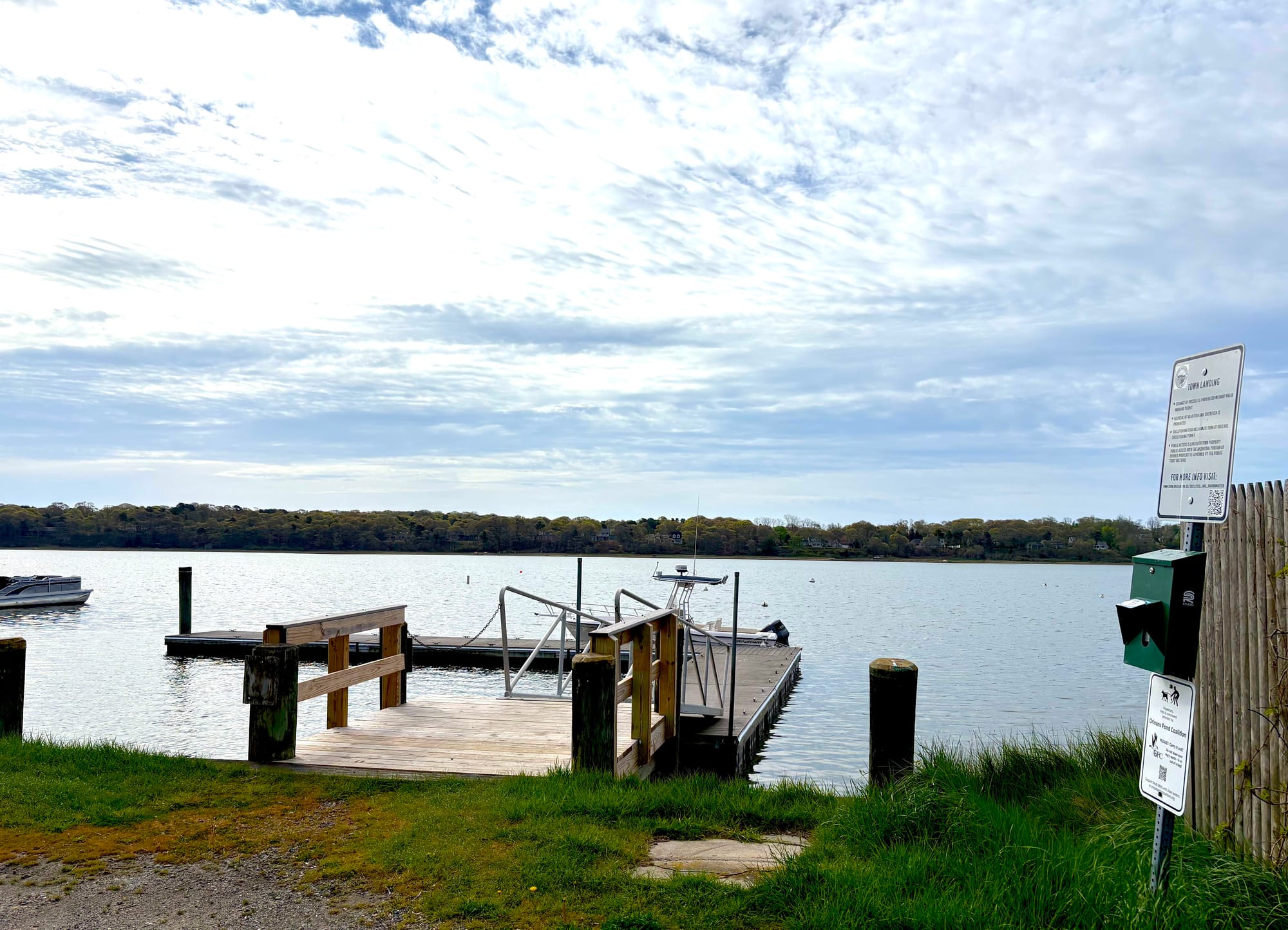
Article 21: Town Cove Bulkhead
Seven years ago, a marine-engineering firm was contracted to perform topside and underwater inspections of the timber bulkhead at the Goose Hummock Town Landing, which receives heavy commercial and recreational traffic from April to December. It was determined that the bulkhead would need to be replaced within five years. The design and permitting was funded at the Fall Town Meeting in October 2022. Now, Article 21 asks for $1.6 million for construction. Here’s how it would affect property taxes. The Select Board and Finance Committee both voted unanimously in support of this article. A two-thirds majority vote at Town Meeting is required for it to pass, followed by the approval of a Proposition 2-½ override on the Town Election ballot on May 20.
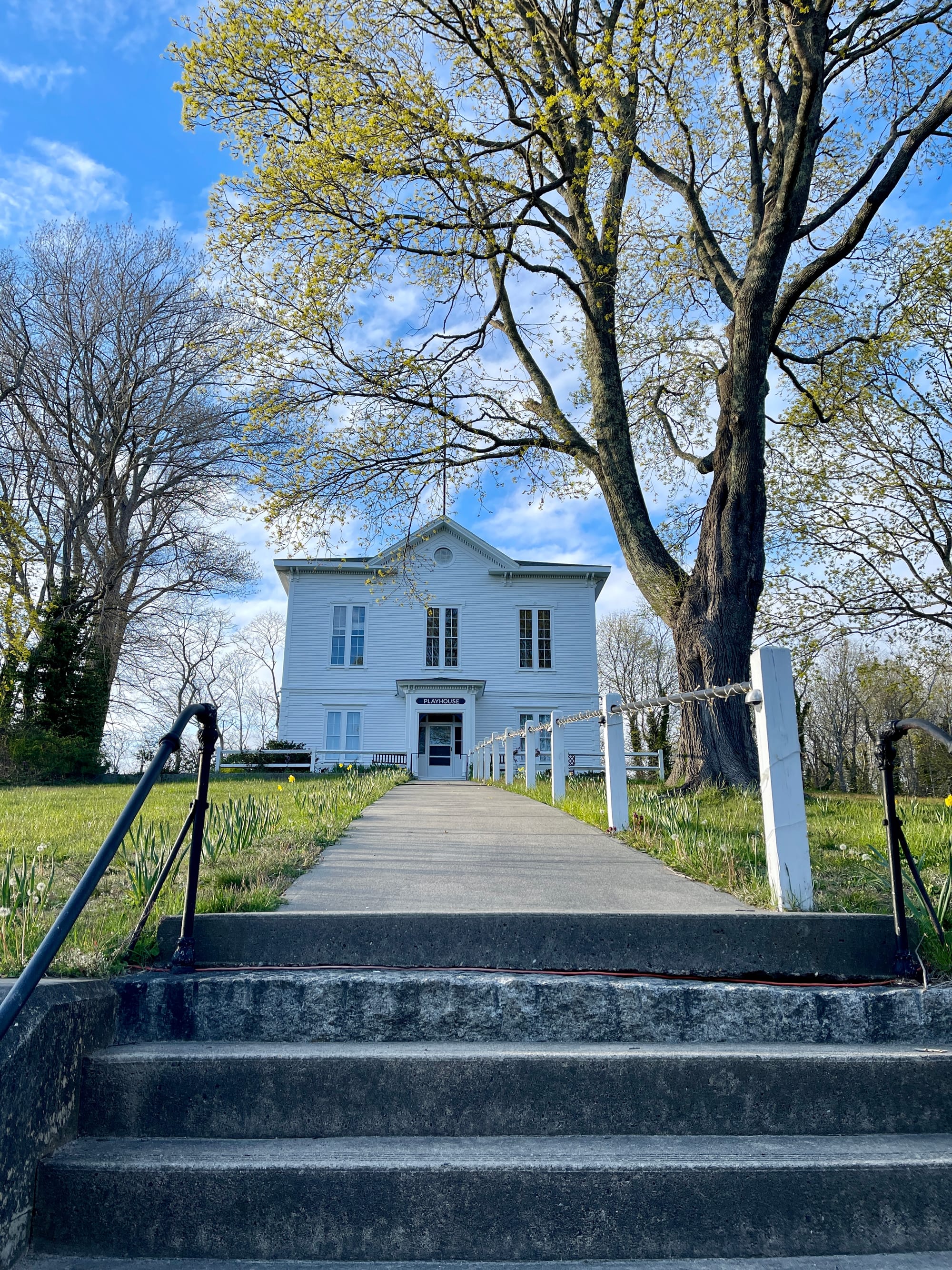
Article 22: Community Preservation Program
Community Preservation Committees (CPCs) have been established in 196 cities and towns across the Commonwealth with the objective of “preserving and improving a community’s character and quality of life.” The appropriations for the Orleans CPC are funded by state contributions and a 3 percent surcharge on our property tax bills.
Each year, our CPC reviews applications from local organizations and town departments seeking to enhance our open space, recreation, affordable housing, and historic preservation initiatives, then offers recommendations for Orleans voters to approve. This year’s list of recommended projects includes funding for the Affordable Housing Trust ($400,000), funding for the Center for Culture and History in Orleans to contribute to a protective structure for Coast Guard vessel 36500 ($245,000), exterior restorations at the Academy Playhouse ($142,000), interior repairs at the Northwest Schoolhouse ($95,030), and debt service from previous years ($379,425). The Select Board and Finance Committee both voted unanimously in support of this article. A simple majority vote at Town Meeting is required for it to pass.
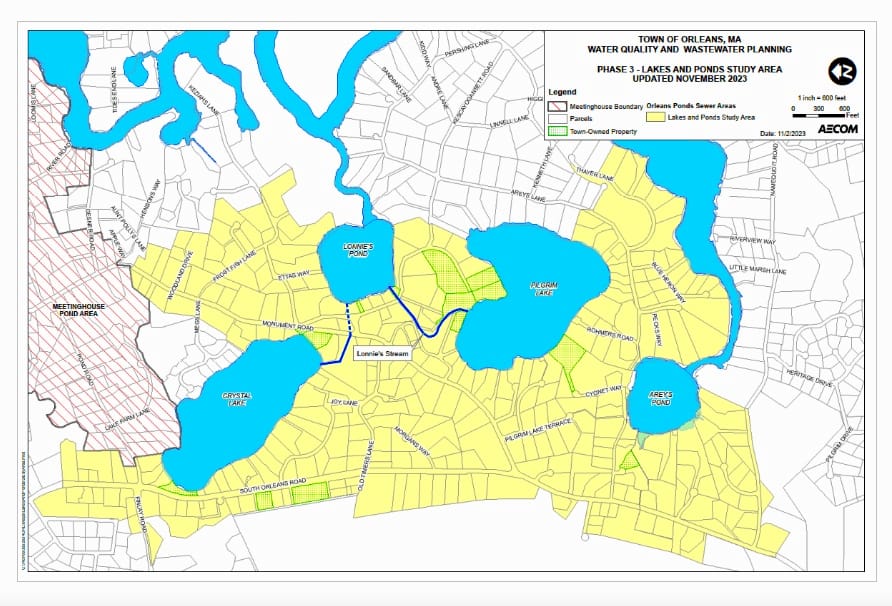
Articles 23-26: Water Quality
Orleans has made a serious commitment to clean water. Residents, committees, Town Hall, and non-profits like the Orleans Pond Coalition and the Cape Cod Commission have invested time and money to protect the shorelines, ponds, lakes, and coves of our town. Phase 3, aka the “Lakes and Ponds” Area is critical to making further progress toward our water-quality goals and maintaining compliance with the landmark Pleasant Bay Watershed Permit, granted by the Commonwealth, which exempts Orleans property owners from new Title V requirements. Article 23 asks for $40.5 million for the construction of Phase 3 and includes all expenses related to the expanded collection systems, improvements to the town’s drainage and water main networks, and the replacement of water services as needed. The Select Board and Finance Committee both voted unanimously in support of this article, with one abstention. A two-thirds majority vote at Town Meeting is required for it to pass.
Article 24 addresses properties in Phase 2, asking for $600,000 to fund connection engineering services and work with property owners, engineers, and contractors to facilitate individual property connections in the Meetinghouse Pond Area, similar to the support offered for Phase 1. The Select Board and Finance Committee both voted unanimously in support of this article with one abstention. A simple majority vote at Town Meeting is required for it to pass.
Water-quality testing and evaluation of two ponds is the focus of the next two articles. Article 25 asks for $122,500 to fund marine and freshwater sampling and monitoring, support for Lonnie’s Pond oystering efforts, and the completion of a management plan for Boland Pond. The Select Board and Finance Committee both voted unanimously in support of this article. A simple majority vote at Town Meeting is required for it to pass.
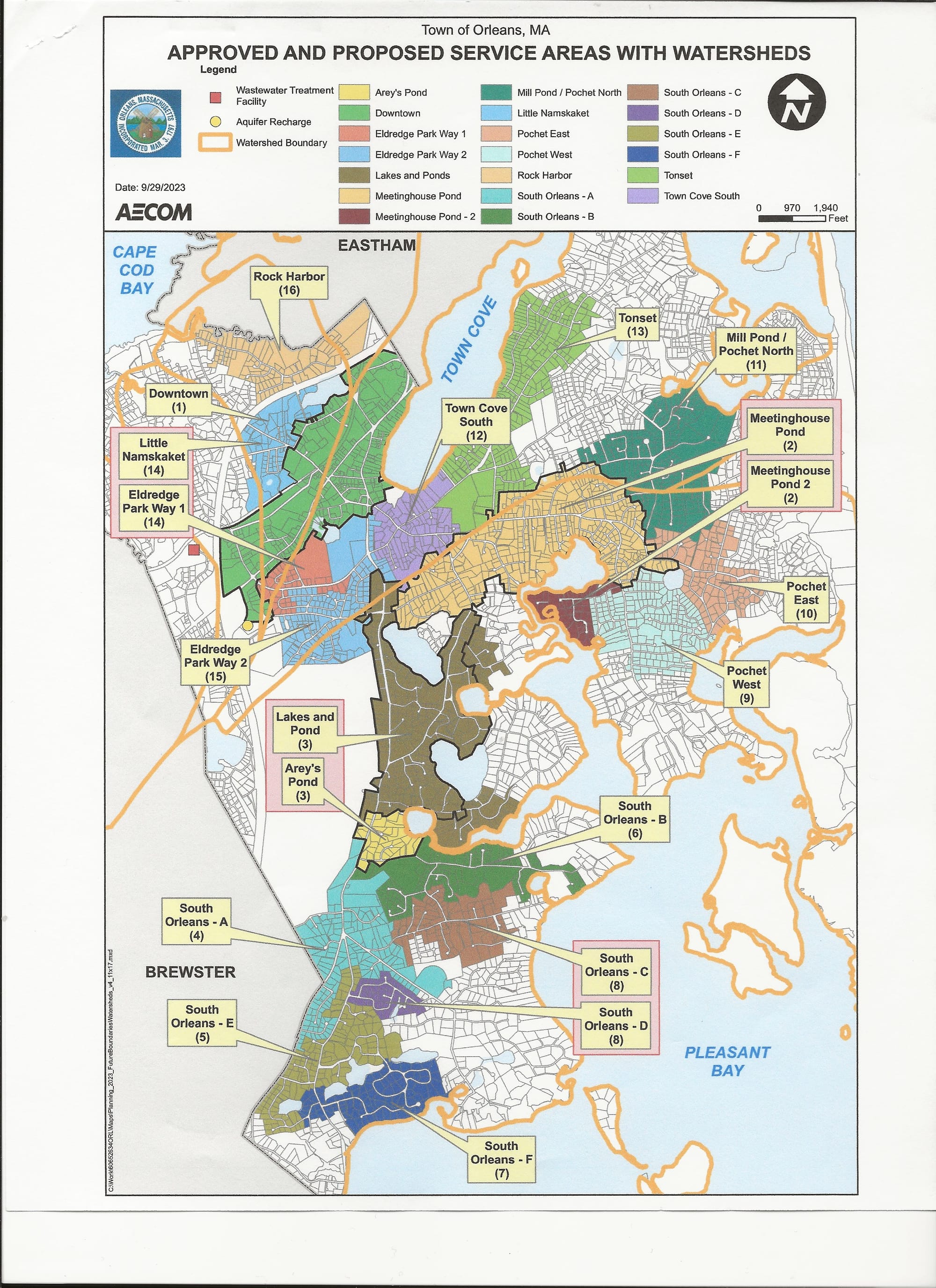
Article 26 asks for $125,000 from the Wastewater Stabilization Fund to complete a nitrogen management evaluation of Mill Pond on the Nauset Estuary to determine if there are short-term solutions to its degraded state. Mill Pond is in especially poor condition — excessive nutrient levels have caused extensive plant and wildlife loss — but is not scheduled for connection to the Wastewater Collection system until decades from now (Phase 11 of the 16-phase plan).
Can something be done to mitigate the damage in the meantime? The Select Board voted in support of the article with one abstention. The Finance Committee voted unanimously in support of this article. A three-quarters majority vote at Town Meeting is required for it to pass. (The Warrant misstates the needed vote.)
For a comprehensive look at water in Orleans — where our groundwater comes from, how it flows, where our wastewater winds up, and how our ponds and lakes are doing — take a look at EXIT 89’s deep dive, Water, Water, Everywhere
Article 27: Pot Shop Couriers
Pot delivery was voted down in the Fall Special Town Meeting with much confusion and little discussion (as described in EXIT 89’s recap). Article 27 is a mulligan — and pretty simple: a proposed zoning change that puts Orleans in alignment with current Massachusetts Cannabis Control Commission regulations by enabling the town’s two licensed cannabis retailers to also obtain licenses to deliver their products to customers. It would also keep the tax revenue from those sales in Orleans, instead of it going to other towns that already have licensed couriers. The Select Board and Finance Committee both voted unanimously in support of this article. A two-thirds majority vote at Town Meeting is required for it to pass.

Article 28: Housing Bylaw Change
This amendment is intended to clarify the long-held misconception in Orleans that the Affordable Housing Trust could not contribute funds to housing for residents making more than 80 percent of the Annual Median Income (AMI). Article 28 would amend the Affordable Housing Trust’s definition of “low and moderate income housing” to 120 percent of AMI.
Article 32: Seasonal Community Designation
The designation of “Seasonal Community” would provide Orleans with access to specialized State grants, programs, and resources that can help with infrastructure, emergency services, workforce housing, and other needs specific to seasonal communities. The new provision was created in collaboration with local leaders of the nine outermost towns of the Cape and parts of the Berkshires. (Here’s the Provincetown Independent’s overview and an op-ed by Jay Coburn and Alisa Magnotta.) Article 32 asks Orleans residents to accept the State’s official Seasonal Community Designation, which comes with no obligations, only opportunities. The Select Board and Finance Committee both voted unanimously in support of this article. A simple majority vote at Town Meeting is required for it to pass.
Article 35: A Citizen Petition + Tax Exemption
Provincetown, Truro, Wellfleet, Barnstable, and Falmouth have passed versions of a “Residential Tax Exemption" or (RTE). As the name suggests, it offers a tax break to certain year-round residents, to be offset by higher taxes for some second-home owners and other high-dollar value property owners. Each town designs its own RTE.
Unlike the other initiatives being voted on, Article 35 did not come to the Warrant through the Select Board. It is a Citizen Petition, brought forward by Orleans resident Tim Counihan. It proposes funding two initial steps in designing a RTE in Orleans.
The petition has generated concern from the Select Board, which wants to vet a potential RTE in a more systematic way. “I would have preferred that we go through a public process with our boards and committees rather than leaping to it,” Select Board member Andrea Reed told the Cape Cod Chronicle last month. Other members cited the potential for widespread confusion that the petition could cause.
If the petition is adopted, residents wouldn’t see a change in their tax bills anytime soon. RTE’s take time to design and implement, beginning with the assessor’s office reclassifying each property, followed by a 2-3 year transition period during which a town needs to fund overlays to mitigate a temporary shortfall in revenue. Article 35 asks for $13,270 to fund the Assessor’s overtime and $6,000 for customized software.
Additionally, since it’s a Citizen Petition, no money would actually be set aside until the Select Board decides to actually pursue this initiative — so this article is essentially a measure of residents’ interest in an exemption. The Finance Committee voted against supporting the article. (The Select Board didn’t take a vote.)
Going Deeper
The Town Meeting Information page of the Orleans website is a great place to go deeper. You can also check out:
- Orleans Citizens Forum's May 1 event — where Town experts and leaders discuss the operating budget, the Fire-Rescue station, and pot shop couriers — can be watched on Vimeo
- Town Hall’s Pre-Town Meeting” presentation to the Select Board is a little like watching a dress rehearsal for the meeting
- Town Hall videos explaining separate Warrant articles
- Town Hall's podcast Orleans: Behind the Scenes has three topical episodes to listen to: Annual Budget, Why Orleans Needs a New Fire Station, and a discussion of the Warrant

Voting Again
Our Annual Election — paper ballots, voting booths! – is Tuesday, May 20, 9:00 AM - 7:00 PM at the Council on Aging/Senior Center, 150 Rock Harbor Road. (Early voting at Town Hall starts May 5 and ends May 16.) Along with potentially seven questions, primarily concerning funding overrides, we’ll also be voting for the following Town Officers:
- 1 Moderator
- 2 Select Board seats
- 2 Constable seats
- 1 Health Board seat
- 1 Nauset Regional School Committee seat
- 1 Elementary School Committee seat
- 1 Housing Authority seat
- 2 Snow Library Trustee seats
You can find more information about our annual election on the Town website. And there's a sample ballot in the back of your Warrant.
We’ll see you at Town Meeting!

EXIT 89 is an independent publication. Our mission is to help Orleans voters make sense of town issues by providing a clear and impartial overview of the latest developments. We want to help fill the information gap, reduce the "mystery" of Town Meeting, and promote vibrant civic engagement.
Our hyperlocal digest is researched and written by journalists Martha Sherrill and Emily Miller. Elaine Baird and Lynn Bruneau are the founding advisors. We are all residents of Orleans. Editing, infographics and tech support are provided by Kazmira Nedeau of Sea Howl Bookshop.
Our digest is 100 percent free — and we aim to keep it that way. With Lower Cape Television (LCTV) — a 501(c)(3) — as our fiscal sponsor, all contributions are now tax- deductible. Donations by a check made out to "EXIT 89" will save us a processing fee. Please send these to: EXIT 89, P.O. Box 1145, Orleans, MA 02653, and thank you for your support!
You can also donate securely online by clicking here.
As always, we’d love to hear from you. What’s on your mind? What would you like to know more about? Readers have enriched our understanding of Orleans — and sharpened our focus. Please share questions, comments, and ideas for future issues by emailing them to hello@exit89.org. And if you are new to EXIT 89, please take a moment to sign up for a free subscription.
